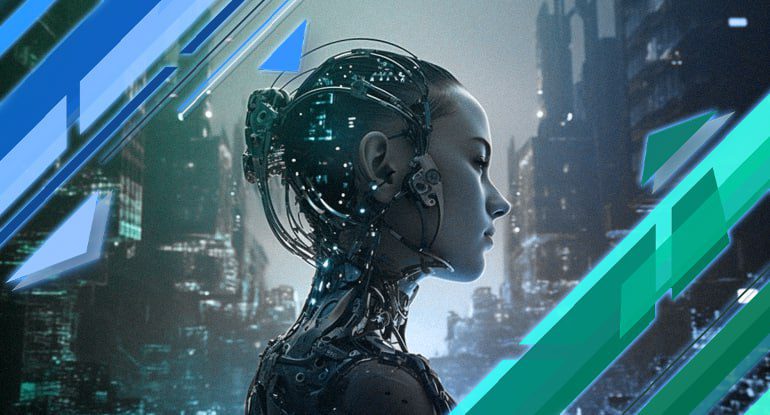How ChatGPT And Generative AI Will Shape The Future Of Work
Artificial intelligence (AI) has become an integral part of technology trends worldwide, revolutionizing how people work and live. In recent times, the discussions surrounding the future of work with ChatGPT and generative AI have gained significant traction, as these technologies have the potential to transform work in various ways.
Understanding ChatGPT and Its Impact on Industries:
1. ChatGPT: ChatGPT is a popular application of generative AI that focuses on generating human-like responses for text inputs. Launched to the public in November 2022, it has already amassed over 100 million users and is poised to revolutionize work in different sectors.
2. Disruption in Specific Industries: The impact of ChatGPT and generative AI will be most pronounced in industries that heavily rely on content creation, customer service, and communication. Healthcare providers can use ChatGPT to offer personalized patient care and appointment booking, while financial service organizations can provide tailored services and flexible scheduling.
3. Transforming Retail: In the retail sector, ChatGPT can offer personalized product recommendations and streamline customer service experiences. It also enables automation of recurring tasks, freeing up employees to focus on more productive activities.
OpenAI and other leading AI labs are making a set of voluntary commitments to reinforce the safety, security and trustworthiness of AI technology and our services. An important step in advancing meaningful and effective AI governance around the world. https://t.co/DaHpBLA7rz
— OpenAI (@OpenAI) July 21, 2023
The Effect of ChatGPT on Organizations:
1. Marketing Department: Generative AI can assist the marketing department in creating product descriptions, promotional copies, and social media content. It can also analyze customer feedback and sentiment to provide valuable insights for marketing strategies.
2. HR Automation: ChatGPT can support HR departments by automating the hiring process, scheduling interviews, and gathering relevant information about companies.
3. Sales Efficiency: In the sales department, ChatGPT can enhance lead generation and provide assistance in answering complex customer queries.
Impact on Consumers and Organizational Culture:
1. Improved Customer Experience: ChatGPT and generative AI can provide 24/7 customer service and personalized recommendations, enhancing customer experiences and feedback analysis.
2. Transforming Organizational Culture: These technologies can influence company culture by improving knowledge sharing and communication, fostering innovation, and connecting employee feedback for actionable insights.
Use Cases of Generative AI:
Generative AI, a subset of artificial intelligence, has demonstrated remarkable potential in a wide range of applications. By leveraging its ability to create original and realistic data, generative AI is revolutionizing various industries and driving innovation. Here are the top 10 use cases of generative AI
1. Content Generation
Generative AI excels in creating human-like content, including text, images, and videos. Content creators can leverage this technology to streamline their workflows, generate blog posts, social media content, and marketing materials. Additionally, generative AI can produce personalized content tailored to individual users, enhancing user engagement and experience.
2. Creative Design
Designers are embracing generative AI to spark creativity and ideation. It can generate unique design concepts, logos, and artwork, providing inspiration and reducing the time required for the creative process. By collaborating with generative AI, designers can explore novel design possibilities and push the boundaries of their creativity.
3. Virtual Avatars and Characters
Generative AI is widely used in the entertainment industry to develop lifelike virtual avatars and characters. From video games to virtual reality applications, generative AI can create realistic characters with unique features and personalities, immersing users in rich and interactive experiences.
4. Image-to-Image Translation
Image-to-image translation is a powerful use case of generative AI, allowing the conversion of images from one domain to another. For instance, it can transform sketches into lifelike images, turn satellite images into maps, or change day-time scenes into night-time scenes. This technology finds applications in creative design, urban planning, and more.
5. Data Augmentation
Generative AI can augment datasets by creating synthetic data, which is particularly valuable in training machine learning models. By generating additional samples, it helps enhance model accuracy, generalization, and robustness. Data augmentation through generative AI is instrumental in various fields, such as healthcare, autonomous vehicles, and natural language processing.
6. Video Game Development
In the gaming industry, generative AI contributes to procedural content generation. It can create vast and diverse game environments, levels, and challenges dynamically. This leads to more engaging gameplay and reduces the burden on developers to manually design every aspect of a game.
7. Language Translation and Chatbots
Generative AI is a game-changer in language translation and natural language processing tasks. It powers advanced translation services, chatbots, and virtual assistants, enabling seamless communication between speakers of different languages and providing instant responses to user queries.
8. Drug Discovery
In the pharmaceutical industry, generative AI assists in drug discovery and development. It can generate novel molecular structures with specific properties, aiding researchers in identifying potential drug candidates and accelerating the drug development process.
9. Music and Art Generation
Generative AI has found applications in the creative arts, generating music compositions, paintings, and other artistic creations. Artists and musicians can collaborate with generative AI to explore novel styles and generate music or art pieces that evoke emotions and resonate with audiences.
10. Personalized Healthcare
Generative AI is increasingly used in personalized healthcare applications. It can analyze medical data, genetic information, and patient records to create personalized treatment plans and predictive models for disease diagnosis and prevention.
The versatility of generative AI makes it a transformative technology across diverse sectors, enhancing productivity, creativity, and efficiency. As the field of generative AI continues to evolve, we can expect even more groundbreaking use cases to emerge, further shaping the future of various industries.
Also, read – Top 10 Crypto Predictions Given By The Infamous ChatGPT
Risks in Implementing ChatGPT and Generative AI:
1. Hallucination Issues: Generative AI models may produce inaccurate or fabricated information, posing risks for users relying on this data.
2. Numerical Reasoning: Generative AI lacks advanced numerical reasoning abilities, necessitating human verification for accurate results.
3. Copyright and IP Risk: Ownership of data generated by AI models can lead to copyright and IP conflicts, requiring resolution for seamless adoption.
4. Privacy Concerns: ChatGPT may inadvertently expose sensitive information or unverified code, affecting productivity and efficiency.
Best Practices for Implementing Generative AI:
1. Embrace Innovation: Organizations should prepare for innovation and open-ended exploration of generative AI technologies.
2. Highlight Opportunities: Managers can present generative AI as an opportunity to reduce the burden of repetitive tasks and encourage skill development.
3. Simplify Tasks: Managers should guide teams in using generative AI to simplify complex tasks, dispelling fears of job replacement.
4. Individual Experimentation: Employees can experiment with generative AI tools to identify strengths and weaknesses and explore career development opportunities.
In conclusion, ChatGPT and generative AI have the potential to revolutionize the future of work by streamlining tasks, enhancing customer experiences, and fostering innovation. While these technologies offer significant benefits, they come with challenges that need to be carefully addressed for successful integration into workplaces. By embracing innovation and implementing generative AI best practices, organizations can prepare for the transformative impact of AI in the workplace.
Stay informed with daily updates from Blockchain Magazine on Google News. Click here to follow us and mark as favorite: [Blockchain Magazine on Google News].
Get Blockchain Insights In Inbox
Stay ahead of the curve with expert analysis and market updates.
latest from tech
Disclaimer: Any post shared by a third-party agency are sponsored and Blockchain Magazine has no views on any such posts. The views and opinions expressed in this post are those of the clients and do not necessarily reflect the official policy or position of Blockchain Magazine. The information provided in this post is for informational purposes only and should not be considered as financial, investment, or professional advice. Blockchain Magazine does not endorse or promote any specific products, services, or companies mentioned in this posts. Readers are encouraged to conduct their own research and consult with a qualified professional before making any financial decisions.

 Bitcoin
Bitcoin  Ethereum
Ethereum  Tether
Tether  XRP
XRP  Solana
Solana  Dogecoin
Dogecoin  USDC
USDC  Lido Staked Ether
Lido Staked Ether  Cardano
Cardano  TRON
TRON  Avalanche
Avalanche  Chainlink
Chainlink  Toncoin
Toncoin  Wrapped stETH
Wrapped stETH  Wrapped Bitcoin
Wrapped Bitcoin  Shiba Inu
Shiba Inu  Sui
Sui  Stellar
Stellar  Polkadot
Polkadot  Hedera
Hedera  WETH
WETH  Hyperliquid
Hyperliquid  Bitcoin Cash
Bitcoin Cash  LEO Token
LEO Token  Uniswap
Uniswap  Litecoin
Litecoin  Pepe
Pepe  Wrapped eETH
Wrapped eETH  NEAR Protocol
NEAR Protocol  Ethena USDe
Ethena USDe  USDS
USDS  Aptos
Aptos  Aave
Aave  Internet Computer
Internet Computer  Cronos
Cronos  POL (ex-MATIC)
POL (ex-MATIC)  Mantle
Mantle  Ethereum Classic
Ethereum Classic  Render
Render  WhiteBIT Coin
WhiteBIT Coin  Monero
Monero  MANTRA
MANTRA  Dai
Dai  Bittensor
Bittensor  Artificial Superintelligence Alliance
Artificial Superintelligence Alliance  Arbitrum
Arbitrum  Ethena
Ethena 





